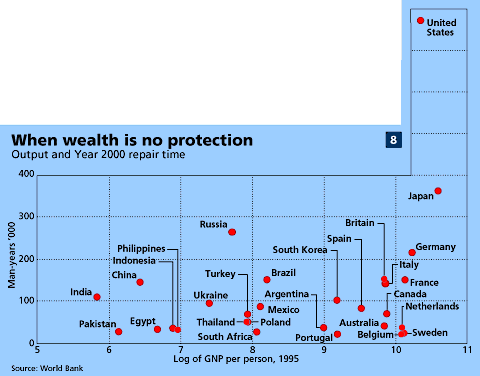|
The least developed countries face special difficulties. Sometimes their software was pirated; sometimes they were given equipment as aid, and the providers do not want to pay for repairs. Hardware is generally ancient, leaving them with no option but to scrap and replace. That is hard for a country whose currency has collapsed against the dollar, which is widely used for invoicing new software and hardware. The poor tend to find themselves at the back of the queue for help from manufacturers, vendors or consultants.

The International Telecommunication Union has set up a working party under Ron Balls, seconded from Britain’s BT. “I’m trying to say to some of the major vendors: you know what’s where. Please tell us.” He is urging big multinationals to help, and chivvying not just telecoms operators, but power and water companies in developing countries as well. Companies such as BT, IBM and Cable & Wireless are offering training. But he frets about Russia and some parts of Central America, which have not even asked for help.

At the World Bank, Carlos Primo Braga, who heads the unit dealing with the issue, has similar qualms. The bank has little money for millennium work. What it has to spend goes to run seminars and help countries such as Mauretania and El Salvador develop national plans. At this late stage, the ponderous bureaucracy of international aid is particularly unhelpful.

For multinationals working in industrialising countries, the main worries are infrastructure and the readiness of key trading partners. Des Dempsey, commercial director of Unilever in Indonesia, says the telephone company there expects to be compliant by the middle of 1999 and the electricity board by the end of that year, but the water company has not taken up his invitation to come and talk. Given the present political and economic turbulence, the Year 2000 may not be the most pressing problem facing many Indonesian companies. Mr Dempsey plans to build buffer stocks to see him through.

Developing countries are likely to become the first victims of “fortressing” next year as rich-world institutions try to insulate themselves from the risks of doing business with them. Commonwealth Bank’s Mr Pritchard recalls a conversation with a businessman who exported to Asia. “They usually pay when the goods arrive,” he said. “But I’m going to change my terms as the millennium approaches and say, pay in advance or it doesn’t go on the ship.”



|

